
Ray Archuleta
Agroecologist, founding partner of Understanding Ag
Ray Archuleta is a certified professional soil scientist with the Soil Science Society of America and has over 30 years of experience as a soil conservationist, water quality specialist, and conservation agronomist with the Natural Resources Conservation Service. During his tenure with the NRCS, Ray served in New Mexico, Missouri, Oregon, and North Carolina. Archuleta received his associate’s degree in livestock science from Northern New Mexico College and a bachelor’s degree in agricultural biology plus 30 hours of graduate work in soil-related courses from New Mexico State University. He served in the Peace Corps for two years in Guatemala as a livestock specialist. After his retirement from the NRCS in 2017, Archuleta founded Understanding Ag, LLC, and Soil Health Academy, LLC, to teach biomimicry strategies and Agroecology principles for improving soil function on a national scale. Archuleta also owns and operates a 150-acre farm near Seymour, Missouri, that he operates along with his wife and family.
2020 presentations:
How Do I Transition My Farm to Regenerative Agriculture? Finding the WHY Before the HOW.
SUMMARY: A battle plan is nothing without logistics. Whether through his long career with the Natural Resources Conservation Service or his latest moves into farming and founding Understanding Ag, LLC, and Soil Health Academy, LLC, Archuleta has spent a lifetime working to improve soil. Archuleta said he’s observed that farmers often want a prescription–a solution that fixes everything. But often they are lacking in the context to understand that applying a principle is just the first step of many to find success in regenerative agriculture. This presentation will deliver information on the NRCS Five Principles of Regenerative Ag, adding in the sixth principle of “context” to alternative cropping systems and management techniques. The keynote address will set the tone for the event. CEU Requested: Nutrient Management
The Future of Regenerative Ag– Closing Keynote Presentation
SUMMARY: Finding optimism and hope in the next era of agriculture. How do we make changes through the lens of regeneration? Understanding Ag, LLC, is ushering in a new era of regenerative agriculture that is resulting in more productive, profitable, and resilient farms across the globe. There is no more important pursuit than to improve the health of our living and life-giving soil and now is the time to get started. Join the Movement! CEU Requested: Nutrient Management
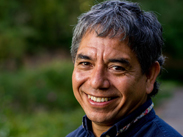
Reginaldo Haslett-Marroquin
President-CEO of Regenerative Agriculture Alliance
Marroquin has pioneered innovations in a regenerative poultry system that is at the center of a multitude of national and international initiatives. This system is designed to be uniquely aligned with the social, economic and ecological conditions of small farms and marginalized communities and is designed for large-scale and global impact. At the Regenerative Agriculture Alliance, Marroquin works on system-level strategies designed for global application, currently, his work covers communities in the U.S., British Columbia, Mexico, Guatemala, and Belize. A native Guatemalan, Marroquin received his agronomy degree from the Central National School of Agriculture, studied at the Universidad de San Carlos in Guatemala and graduated from Augsburg University in Minneapolis. Marroquin currently lives in Northfield, Minnesota, with his wife Amy and their kids William, Ana Nicktae, and Lars Decarlo.
2020 presentation:
Chickens, Climate, and Community
SUMMARY: This session will cover large-scale system-level planning, mid-level industry opportunities, and farm-level nuts and bolts of regenerative poultry as a powerful sector that can deliver high-impact short and long-term results with a triple bottom line strategy. In this session, Regenerative Agriculture Alliance’s (RAA) founder will engage the audience in reviewing a full system design for deploying regenerative poultry globally, report on operations and progress already achieved on the ground, and layout the process blueprint for scaling-up this system globally. Using the mighty bird as the center of a whole-system redesign the RAA is bridging powerful climate solutions grounded on community engagement, sound economic formulas, large-scale impact centered on aggregating small-farming operations and capturing the industrial-scale demand for regenerative products with integrity and long-lasting core strategies that assure a permanent validation of community, climate and economic returns on investment. CEU Requested: Crop Management- New technologies in sustainable agriculture
Regenerative Poultry System: An Introduction on Why Regenerative Ag is Important
SUMMARY: Participants in this workshop will learn about the foundational indigenous nature of the regenerative poultry system, from coop design, to the forest-based ecosystem that is central to the health of poultry, the ecosystem on the farm and the quality of life for farmers and consumers. The workshop will also elaborate on production methodology, scalability, financial proformas and the large-scale impact the system is designed to deliver. Farmers, regional economic development officials, organizers, and business people will walk away with a full system-level framework that can support their decisions on all regenerative poultry-related matters. CEU Requested: Crop Management- New technologies in sustainable agriculture
Click to view Reginaldo Haslett-Marroquin’s presentation slides
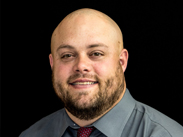
Lance Gunderson
Regen Ag Lab – president and co-owner
Gunderson attended the University of Nebraska at Kearney earning his bachelor’s in biology and chemistry in 2005 and his master’s in biology in 2012. He is currently attending the University of Nebraska at Lincoln seeking a doctoral degree in agronomy with an interest in soil microbial ecology and soil health. Gunderson served as the director of Soil Health and New Test Development at Ward Laboratories for nearly eight years where he and his team implemented and performed Haney, PLFA, soil enzymes, aggregate stability, and water holding capacity tests. In 2018, Gunderson also started Soil Health Innovations, which offers the SR-1 instrument for measuring soil respiration and consulting services surrounding the Haney Test. He is a founding member and president of Regen Ag Lab, which he hopes will be open for business in early 2020. Regen Ag Lab will continue to focus on agronomic tests designed to aid producers in managing their operations under the regenerative ag model. We will offer many of the established tests as well as explore new testing options as they are developed.
2020 presentations:
What Can Soil Health Tests Tell Us?
SUMMARY: Soil testing is a valuable set of tools to help you understand the current status of your soil from a chemical, physical and biological perspective. Most traditional soil tests, however, are focused on the former with little regard for biological properties or ecological function. Therefore, we are only seeing part of the picture when we are trying to make educated choices regarding soil management. Soil health tests provide a different perspective and allow land managers greater insight into the soil environment as a living and highly integrated system. The focus of this presentation is to introduce some of these new tests along with how you can use the results to make decisions aimed at reducing your conventional inputs while increasing your overall profitability. Learn the theory of many different soil health tests such as PLFA, Haney, soil enzymes, aggregate stability, and water holding capacity. In understanding what each test measures, we will begin to understand how to choose the correct test based on the primary resource concern. CEU Requested: Nutrient Management- Analysis, interpretation, and uses of soil testing data
The Haney Test: From Theory to Practice PLUS Producer Panel
SUMMARY: Understanding the results provided by the Haney Test may seem overwhelming, but there is meaning behind the numbers. The goal of this presentation is to provide you with the tools and understanding of how to walk through your own results. Learn the theory of many different soil health tests such as PLFA, Haney, soil enzymes, aggregate stability, and water holding capacity. In understanding what each test measures, we will begin to understand how to choose the correct test based on the primary resource concern. CEU Requested: Nutrient Management- Analysis, interpretation, and uses of soil testing data
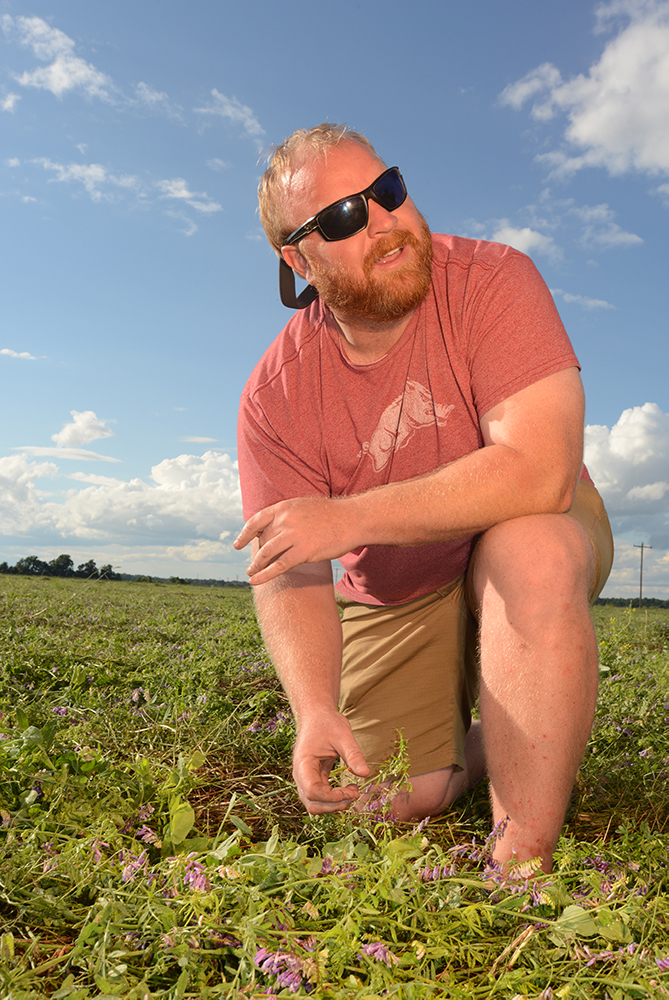
Adam Chappell
Chappell Brothers Farm LLC
Adam Chappell is a fourth-generation farmer in Cotton Plant, Arkansas, farming around 9,000 acres of cotton, corn, soybeans, with his brother, Seth Chappell. Adam earned a bachelor’s in botany from Arkansas State and a master’s. in entomology from the University of Arkansas. During this time, he developed an interest in research and ecological principles that led him to question the conventional methods of farming. Looking for a way to cut costs through cultural means, along with the need to control herbicide-resistant weeds, such as palmer amaranth, led to experimenting with cover crops and a passion for soil health.
2020 presentation:
Profitability: An Inevitable Result of Regenerative Ag – A discussion on how our transition from a conventional to a regenerative system has made our farm profitable by reducing the needs for technologies and inputs that we once deemed a necessity.
Summary: “Profitability: An inevitable result of regenerative ag” will take us through the journey of two brothers from Arkansas. Both went to college with ideas of leaving the farm for good, but it called them back home in 2005 when they joined their father’s operation. The mission? How can the principles of ecology be applied to the farm? The change from conventional tillage and traditional southern row crop farming to no-till and covers has allowed them to maintain top yields in the area and reduce input costs significantly. This will be a look at how our transition from a conventional to a regenerative system has made our farm profitable by reducing the needs for technologies and inputs that we once deemed a necessity. CEU Requested: Crop Management– Managing production risk
Regenerative Ag Producer Panel
SUMMARY: Hear from leading producers who have transitioned their farming operations from conventional operations into regenerative agriculture using a systems approach to decisions. Hear about the equipment changes, seed selection, soil health testing interpretation and the economic impact of soil health strategies. Moderated by Jess Gnad. CEU Requested: Crop Management-Innovations in cropping systems management
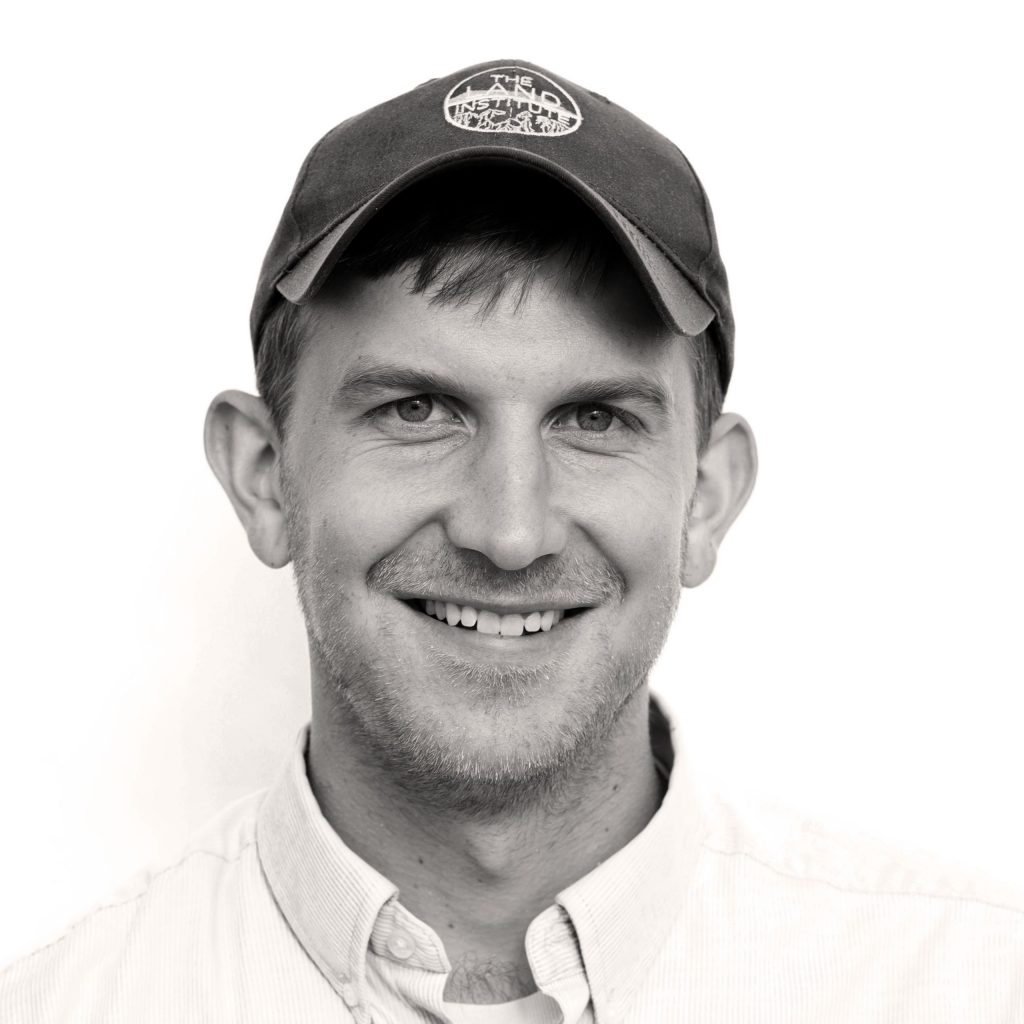
Brandon Schlautman, PhD
The Land Institute
Brandon Schlautman is the lead scientist of the perennial legumes program at The Land Institute in Salina, Kansas. His team is conducting agronomic studies to design dual-purpose intermediate wheatgrass (IWG) + perennial legume (alfalfa) mixtures that produce both Kernza perennial grain for human consumption and IWG + legume forage for livestock. Additionally, he leads a breeding program to develop perennial forage legumes for companion cropping and a domestication program to develop new perennial grain legume crops.
2020 presentation:
Is the Future of Agriculture Perennial? – Could the natural agro-ecosystems from our past be the key to solving the cropland problems of our present?
Summary: Our ancestors began filling our agricultural toolbox 10,000 years ago by domesticating wild annual plants. By becoming dependent on these tools–annual grain crops–we inadvertently converted diverse natural ecosystems composed of perennial plants (prairies) to monoculture annual agro-ecosystems. Consequently, we traded the services those perennial ecosystems offered (soil formation, nutrient retention, and carbon sequestration/storage) for a steady food supply and some unintended baggage (soil erosion, loss of soil carbon, and degraded cropland). We need new tools in our toolbox. At The Land Institute and elsewhere, researchers are inventing these new tools by breeding and domesticating perennial versions of our common grains: wheat, sorghum, rice, sunflowers, and legumes. We hope someday these new tools allow farmers to manage diverse perennial agro-ecosystems that restore ecosystem services in their fields while still accomplishing their essential work, feeding people. My research focuses on developing dual-purpose intermediate wheatgrass + alfalfa intercropping systems that produce Kernza(R) perennial grain for humans and spring and fall/winter forage for grazing livestock. This work is in its infancy (annual grains have a 10,000-year head start!), but we are excited to have a proof of concept perennial grain cropping system that captures the key features of natural ecosystems (diversity and perenniality). CEU Requested: Crop Management– Emerging technologies in alternative production systems
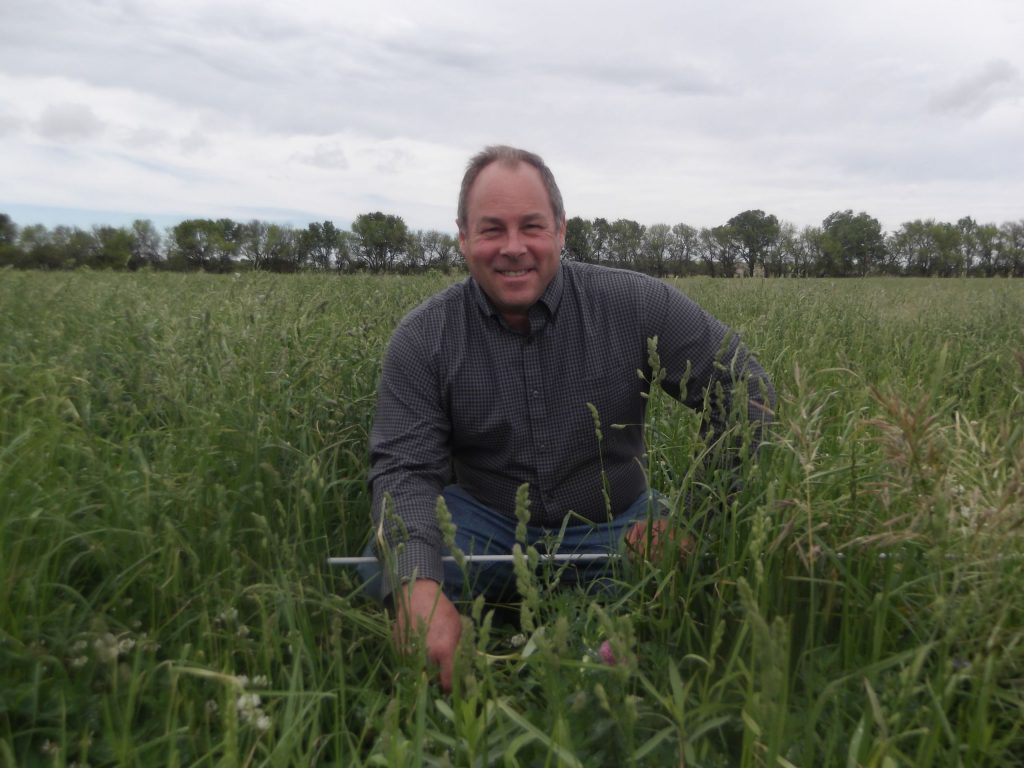
Dale Strickler
Agronomist for Green Cover Seed
Dale Strickler is the author of “Managing Pasture and The Drought-Resilient Farm.” He is a leader in the soil health movement and an agronomist for Green Cover Seed, the nation’s leading cover crop-specific seed company. Strickler holds degrees in agronomy from Kansas State University and has taught at the collegiate level for 15 years. Since 2000, Strickler has operated his own farm/ranch in north central Kansas.
2020 presentation:
Carbon 101: More Carbon, More Money Learn techniques that improve profitability while simultaneously increasing soil carbon.
Summary: The world’s soils hold a significant amount of carbon – more than double the amount in the atmosphere. But most agricultural soils have experienced the loss of soil carbon as destructive farming practices became the norm. Dale Strickler will discuss the premise of the carbon cycle and what every producer needs to know in order to cycle more carbon into soils. Soil carbon storage directly benefits farmers by improving soil fertility, reducing erosion and increasing resilience to droughts and floods. He thoroughly delves into the management, implementation, and integration of crops and livestock to enhance the physical properties of the soil, therefore creating carbon-rich soil that feeds biology and sequester carbon. Dale will also review the economic benefits of healthy soil to increase farm profitability. CEU Requested: Crop Management– Integrating soil, climate, and crop data in crop management systems
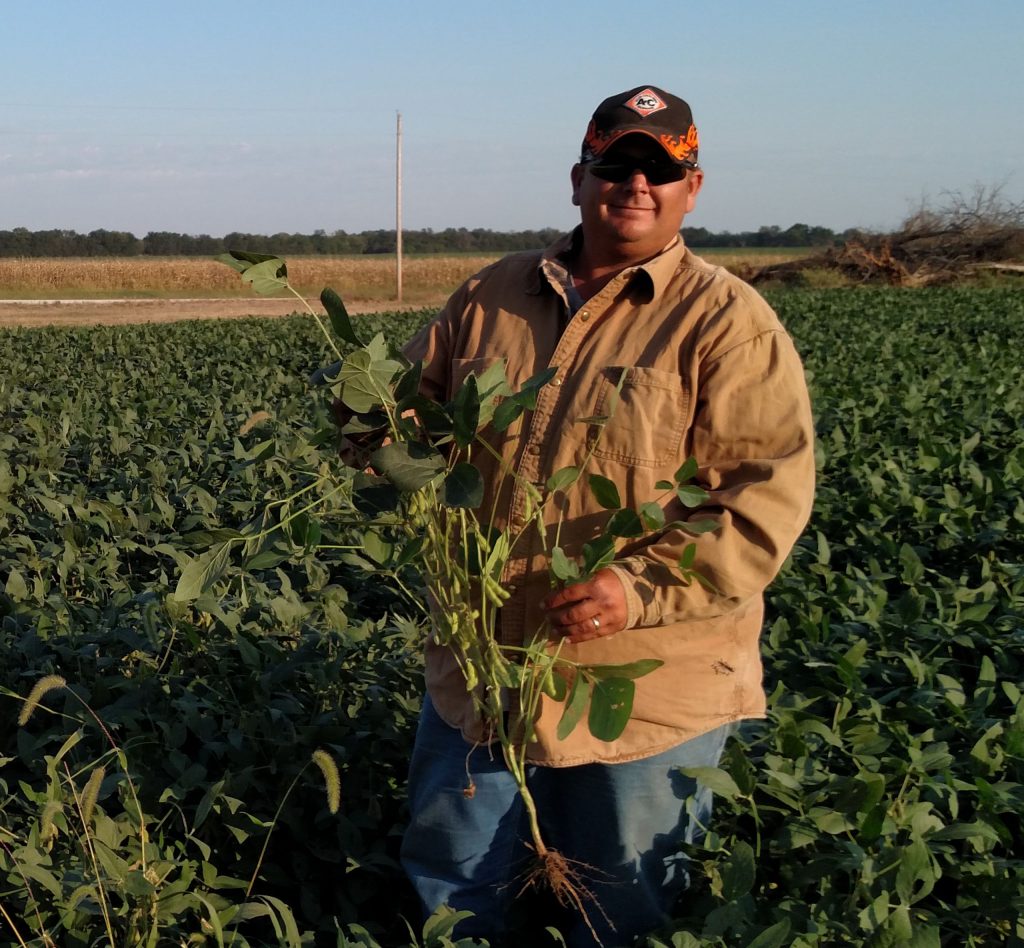
Darin Williams
Natural Ag Solutions, LLC.
Darin and Nancy Williams own an operate D&N Ag Farms in Waverly, Kansas. They farm 2,000 acres of diverse cash crops that consist of non-GMO soybeans, wheat, rye, barley, triticale, sunflowers, and corn. They raise grass-fed and finished beef with their herd of British White cattle. Layers, broilers, and turkeys are also in the mix of grass-finished products. Diversity in the crops and livestock is what the Williams think helps keep the biology in the soil alive and rejuvenated. Two years ago, Darin and his dad started Natural Ag Solution LLC in Moran, Kansas, to help supply cover crop seed. The company is also a non-GMO seed supplier and makes custom wildlife blends. Teaching customers and helping them understand regenerative ag principals comes first. Selling them seed comes second. Whether it is cash crops, livestock, or deer plots, organic matter is the key to profitability.
2020 presentation:
Regenerating Degraded Soils With Cover Crops and Livestock – Come hear how Willaims has successfully integrated long-term crop rotations, cover crops, and grazing livestock. Learn about their regenerative ag principles, like grazing cover crops, and how they’ve come to conclude that soil organic matter is the key to profitability.
Summary: Regenerating Degraded Soils With Cover Crops and Livestock” will feature a lively presentation from Darin Williams about how he uses a diversity of species in his 2,000-acre farming operation. From Non- Gmo soybeans, wheat, rye, barley, triticale, sunflowers, and corn. They raise grass-fed and finished beef with a herd of British White Cattle. Layers, Broilers, and turkeys are also in the mix of grass-finished products. Diversity in the crops and livestock is what helps keep the biology in the soil alive and rejuvenated. Whether it is cash crops, livestock or deer plots Organic Matter is the key to profitability. A diversity of crops and livestock is what helps keep the biology in the soil alive and rejuvenated. Come hear how Willaims has successfully integrated long-term crop rotations, cover crops, and grazing livestock. Learn about their regenerative ag principles, like grazing cover crops, and how they’ve come to conclude that soil organic matter is the key to profitability. CEU Requested: Crop Management–Management techniques for row-crop, grain, forage, turf, organic, vegetable, and horticulture production systems
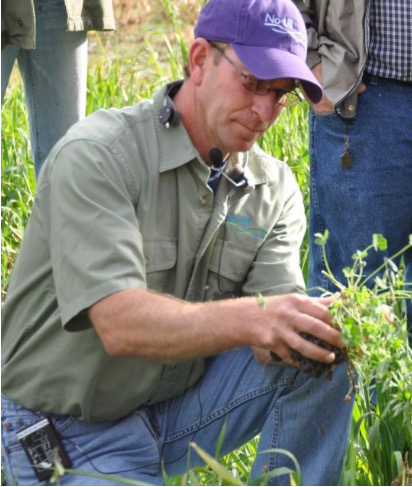
Gail Fuller
Fuller Farms
Fuller has been experimenting with no-till in Kansas since the mid-1980s and has been 100% since 1995. The further he gets into his journey, the more regenerating soil health has become his main focus. When Fuller started looking into what it would mean for his family farm to be ecologically regenerative, he found himself learning the science behind soil life, photosynthesis, and the carbon, mineral and water cycles. He also started finding direct correlations between the health of the soil and his own health.
For Gail, Regenerative Agriculture is not just regenerating soil, but the (re)growing of communities. This includes human, wildlife, and microbial communities. Helping to make them stronger and more resilient.
2020 presentations:
The key to no-till is cover crops and the key to cover crops is livestock
SUMMARY: Join Gail Fuller as he takes you on his journey of a soil health discovery into regenerative agriculture. What started as experimentation, Kansas farmer Gail Fuller began with no-till farming on and off during the 1980s. Influential farmers and researchers from around the world helped encourage Fuller and led to further experimentation with adding in no-till + multispecies cover crops + diverse crop rotation + integrating livestock back into his operation. Fuller now views his operation from a systems approach and will speak on the many compounding effects of increasing overall diversity which will lead to increased profitability and nutrient cycling. The way to grow soil is through biodiversity, both above and below ground. CEU Requested: Soil & Water Management – Effect of physical, chemical and biological properties of soils on management practices
Chickens, Climate, and Community: How does this relate in Kansas?
SUMMARY: Regenerative Agriculture is not just regenerating soil, but the (re)growing of communities. This includes human, wildlife, and microbial communities. Helping to make them stronger and more resilient. Fuller’s session will help attendees explore the sometimes cumbersome topic of a changing climate back home to the farm. What challenges are faced by modern producers and what solutions can be found locally? Drawing deep from his personal experiences, Fuller will bring this topic home to Kansas.CEU Requested: Soil & Water Management – Effect of physical, chemical and biological properties of soils on management practices
Regenerative Ag Producer Panel
SUMMARY: Hear from leading producers who have transitioned their farming operations from conventional operations into regenerative agriculture using a systems approach to decisions. Hear about the equipment changes, seed selection, soil health testing interpretation and the economic impact of soil health strategies. Moderated by Jess Gnad. CEU Requested: Crop Management-Innovations in cropping systems management
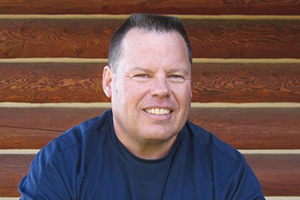
Kevin Fulton
Fulton Farms
Fulton operates Fulton Farms, a holistically managed organic farming operation near Litchfield, Nebraska. This diversified farm includes a pasture-based, multi-species livestock operation along with hay, grains, cover crops, and custom grazing enterprises. Fulton Farms has drawn visitors from around the world and has been featured in numerous publications, books, and documentaries. Fulton has presented at events from New York City to Los Angeles, educating consumers, farmers, advocacy groups, university students and faculty.
2020 presentation:
Regenerative Agriculture: Revitalizing Rural Communities and Family Farm Agriculture
SUMMARY: This presentation will address problems and outline strategies and solutions for farmers and rural advocates in an effort to revitalize family farms and rural communities. Regenerative agriculture and building soil is the foundation of this transformation but the benefits go far beyond soil health! Regenerative farming is the key to rural economic development. Over the years, family farmers have lost much of their independence and rural towns have lost their vibrancy. Fulton Farms started making significant changes back in 2001, in an effort to regain independence and insulate themselves from much of the market volatility and rising input costs that currently plague the farming sector. This journey continues today and their real-life farming successes and failures will be shared. Both historical and current trends and correlations in farming will be analyzed and discussed. A strong focus will be on biomimicry, resiliency and the importance of profitability and people. You won’t be regenerative for long if you can’t stay in business or if you don’t keep the legacy going for future generations after your departure from the farm. CEU Requested: Crop Management- Management techniques for row-crop, grain, forage, turf, organic, vegetable, and horticulture production systems
Regenerative Ag Producer Panel
SUMMARY: Hear from leading producers who have transitioned their farming operations from conventional operations into regenerative agriculture using a systems approach to decisions. Hear about the equipment changes, seed selection, soil health testing interpretation and the economic impact of soil health strategies. Moderated by Jess Gnad. CEU Requested: Crop Management-Innovations in cropping systems management
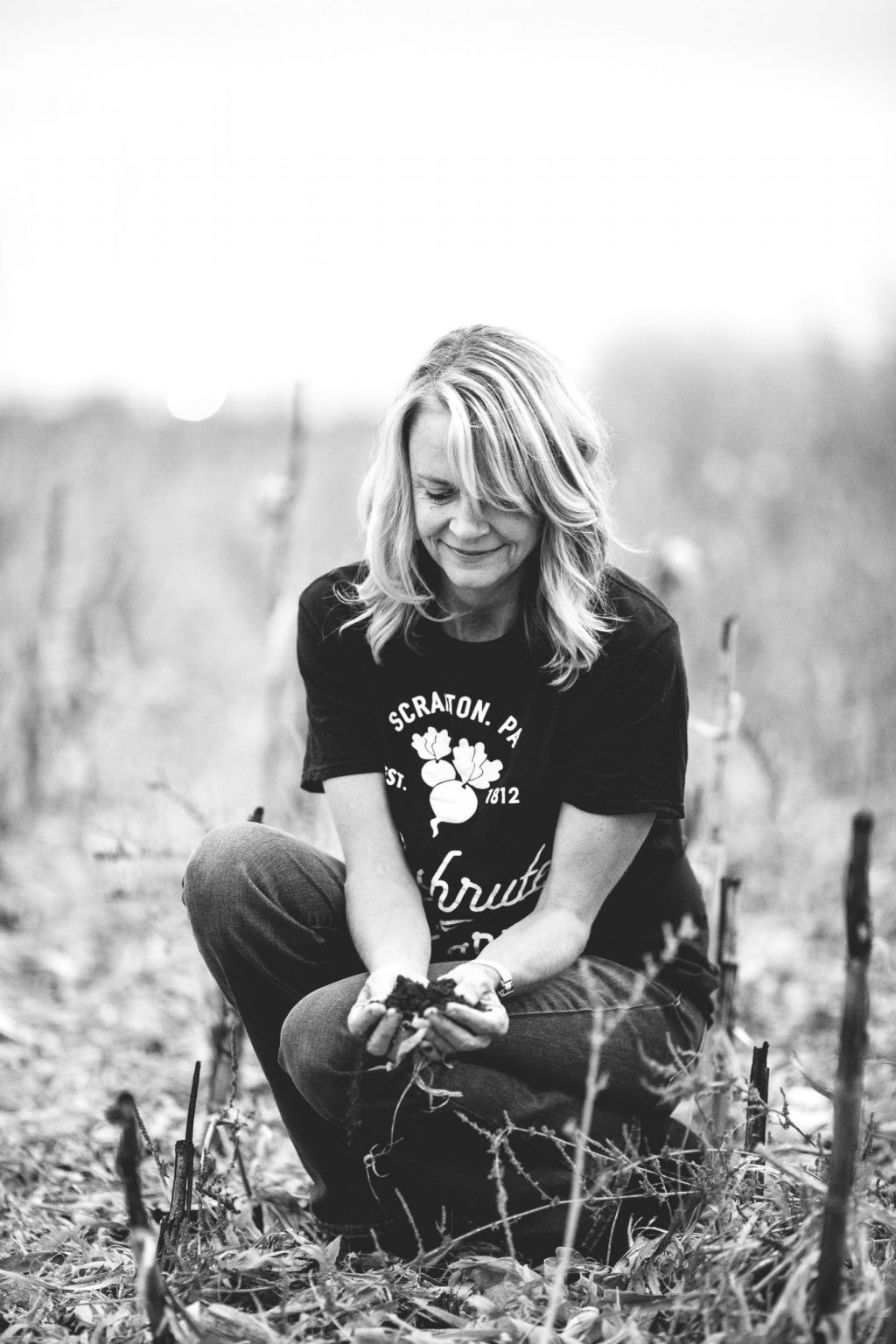
Liz Haney, Ph.D.
Regen Ag Specialist for Indigo Ag and Owner Soil Regen
Haney’s passion is working with the people that spend their lives caring for our soil and helping them to achieve profitability and resilience. After almost 20 years of service with the State of Texas and private labs, she started her own consulting company focusing on regeneration, reclamation, and restoration of land using the principles of soil health. Haney and her husband are responsible for developing the Haney Test as a more holistic way of measuring the soil ecosystem. Haney has extensive knowledge of soil testing and interpretation of data as it relates to management and environmental conditions. She also has experience in systems modeling using various data input platforms aimed at understanding nitrogen fertility, soil calibration, water quality, and climate predictions.
2020 presentation:
“Women in Regenerative Agriculture” Panel Discussion
SUMMARY: Women, who are often considered the backbone of agricultural operations, are stepping up to the forefront of regenerative agriculture. Hear from women leaders in regenerative agriculture about their experiences and journeys as they have transitioned soil, ideas, and communities. Each panel member has a unique story that led them from various career paths and into soil health education. CEU Requested: Crop Management- Innovations in cropping systems management
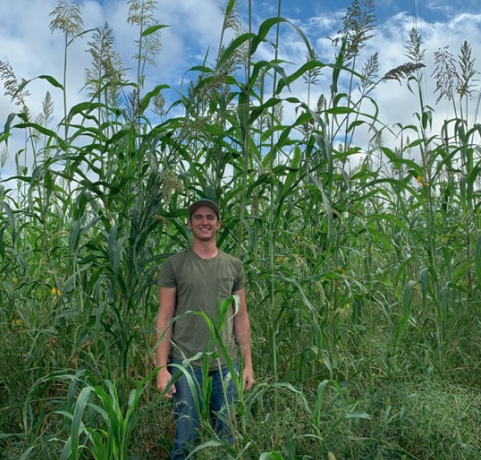
Macauley Kincaid
Kincaid Farms
Macauley Kincaid is a 25-year-old regenerative farmer. His operation consists of 500 acres of row crops and pasture. Kincaid embraces all the soil health principles on his operation. He truly believes self-education and dedication are important to making a farm function accordingly and profitably. Kincaid’s motto is “It’s not about what you make, it’s about what you save.”
2020 presentation:
Lance Gunderson – The Haney Test: from Theory to Practice PLUS Producer Panel
SUMMARY: Understanding the results provided by the Haney Test may seem overwhelming, but there is meaning behind the numbers. The goal of this presentation is to provide you with the tools and understanding of how to walk through your own results. Learn the theory of many different soil health tests such as PLFA, Haney, soil enzymes, aggregate stability, and water holding capacity. In understanding what each test measures, we will begin to understand how to choose the correct test based on the primary resource concern. CEU Requested: Nutrient Management- Soil sampling procedures
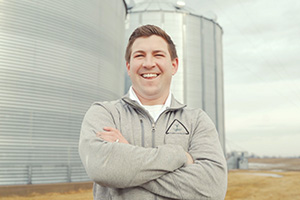
Mitchell Hora
Founder and CEO Continuum Ag
Hora is a young entrepreneur and seventh-generation farmer from southeast Iowa. With his father, he deploys regenerative systems on 800 acres of corn and soybeans. Horal started Continuum Ag four years ago and has amassed a footprint of 40 states and 8 countries.
2020 presentation:
Quantifying the Living. Dynamic. Continuum. Stop treating your soil like dirt and stop quantifying it as a dead, static growing medium.
SUMMARY: The soil is alive and technology is available to help us work with our soil as a Living. Dynamic. Continuum. Learn about quantifying soil health, the Haney Soil Health test, making money with soil health, and the future of sustainable agriculture. This session will outline specific processes and data that can be used to both quantify and improve soil health on their operations. In his classroom, Hora will show attendees how they can take what they’ve learned from the Haney soil health test and make adjustments to their management to improve soil resiliency and function. He’ll also provide an overview of emerging credit markets for sequestered carbon and what opportunities may exist with carbon credits in the future. CEU Requested: Nutrient Management- Soil sampling procedures
Lance Gunderson – The Haney Test: from Theory to Practice PLUS Producer Panel
SUMMARY: Understanding the results provided by the Haney Test may seem overwhelming, but there is meaning behind the numbers. The goal of this presentation is to provide you with the tools and understanding of how to walk through your own results. Learn the theory of many different soil health tests such as PLFA, Haney, soil enzymes, aggregate stability, and water holding capacity. In understanding what each test measures, we will begin to understand how to choose the correct test based on the primary resource concern. CEU Requested: Nutrient Management- Soil sampling procedures
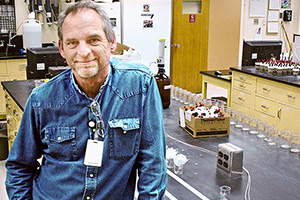
Rick Haney, Ph.D.
Soil Scientist – U.S. Department of Agriculture-Agricultural Research Service
Rick Haney received his master’s and a doctorate in soil fertility, chemistry and microbial ecology from Texas A&M University in 2001. He has worked as a research scientist for the past 17 years as a research soil scientist for the USDA-ARS, at the Grassland Soil and Water Research Laboratory, Temple, Texas. He is responsible for developing research on soil microbial activity, soil testing methodologies, and cropping systems for organic and conventional farming. This research includes the development of soil test methods for evaluation of short-term soil microbial activity as a tool for assessing the nutritive potential of various land management systems and the characterization of the role of various soil organic carbon and nitrogen fractions in nutrient cycling and biophysical alteration of soil as well as a new soil extractant that mimics a growing plant root.
2020 presentation:
Soil Testing for the 21st Century Researcher Rick Haney preaches the benefits of healthy soils. His message is simple: Although the U.S. has some of the richest soils in the world, decades of agricultural abuse have taken their toll, depleting the dirt of essential nutrients and killing off bacteria and fungi that create organic material essential to plants.
Summary: Researcher Rick Haney will teach the benefits of healthy soils. His message is simple: Although the U.S. has some of the richest soils in the world, decades of agricultural abuse have taken their toll, depleting the dirt of essential nutrients and killing off bacteria and fungi that create organic material essential to plants. The Haney test uses unique soil extracts in the lab to determine what quantity of soil nutrients are available to soil microbes. This test also evaluates soil health indicators such as soil respiration (Solvita CO2 burst test), water-soluble organic carbon and organic nitrogen and their ratio. These results indicate the amount of food that is readily available to soil microbes and is sensitive to measuring root exudates and decomposed organic material. These numbers should be used as a comparison over time to determine progress in improving soil health. This presentation will cover the “way”, the “why”, and the “how” of soil health testing. CEU Requested: Nutrient Management- Analysis, interpretation, and uses of soil testing data
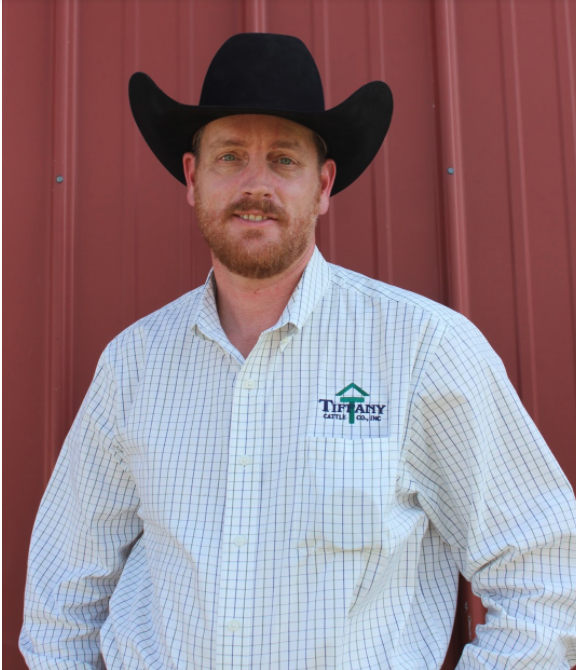
Shawn Tiffany
Tiffany Cattle Co.
Shawn Tiffany co-owns Tiffany Cattle Company in Herington, Kansas, with his brother Shane. Tiffany Cattle Company operates custom cattle finishing facilities in Morris and McPherson counties with a combined capacity of 32,000 head. The business has earned the Certified Angus Beef Feedlot Commitment to Excellence Award and focuses on feeding front end genetics for producers throughout the Midwest. Shawn manages the business’s farmland which includes a regenerative no-till and cover crop strategy on which customer cattle are grazed and feedstuffs for the feedlot are raised. TCC typically has cattle in grazing systems 10 months of the year and produces all of the business’s silage needs. Soil health is a big part of the operation’s focus and cover crops and grazing plays an integral role in that philosophy.
2020 presentation:
Soil Health as a Driver of Profitability & Flexibility Discussion of different philosophies including the integration of livestock, use of biological foliar feeding in place of synthetic inputs, and using covers as a self-insured concept.
Summary: Shawn Tiffany will instruct attendees that soil health means sustainability, profitability, and economics for not only our families but also the families that we serve. Healthy and sustainable farming systems ensure that each of us has something to look forward to in the future. Ultimately, it is simply stewardship of creation. This presentation will provide a discussion of different philosophies including the integration of livestock, the use of biological foliar feeding in place of synthetic inputs, and using covers as a self-insured concept. CEU Requested: Crop Management-Integrating soil, climate, and crop data in crop management systems
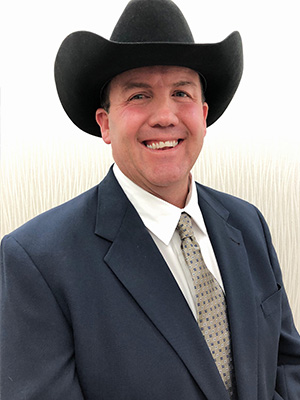
Tom Cannon
Goodson Ranch
Cannon cut short his Oklahoma State University education due to his father’s debilitating pickup wreck in 1997. He came back to the farm to discover his soil was at 1% organic matter. Cannon attended his first No-Till on the Plains in January 1998, a life-changing experience. The new Goodson Ranch CEO sold all tillage equipment and converted to 100% no-till – and now, among other radical experiences, he finds his soil testing at over 3% organic matter. He has since received numerous conservation awards but telling others about his farm’s transformation is his focus. Sharing his successes and failures on regenerative ag through public speaking engagements and the personal relations gleaned at these engagements are an increasing priority. Soil and the soil’s biological relationships are foundational to the success of the Goodson Ranch.
2020 presentation:
Is Your Farming Operation Going Extinct? – How to keep production ag from becoming a dinosaur. With so many changes in the farming atmosphere, this presentation will discuss ways not to get left behind.
Summary: How to keep production ag from becoming a dinosaur. With so many changes in the farming atmosphere, this presentation will discuss ways not to get left behind. Life on the farm has always been stressful and difficult. But it’s even more challenging today as farmers and ranchers deal with depressed commodity prices, rising input costs, unpredictable trade tariffs, devastating natural disasters and more. Cannon will take attendees on a journey into his soil health experience of how he transitioned from a chemical approach to farming into a biological approach. He will review the benefits of utilizing the principles of regenerative ag including an emphasized approach to understanding how the water cycle functions in healthy soil. Healthy watersheds are a byproduct of healthy soil. Cannon will showcase his support using ancient technology as well as recent innovations in agriculture. Don’t be left behind! CEU Requested: Soil and water management
Regenerative Ag Producer Panel
SUMMARY: Hear from leading producers who have transitioned their farming operations from conventional operations into regenerative agriculture using a systems approach to decisions. Hear about the equipment changes, seed selection, soil health testing interpretation and the economic impact of soil health strategies. Moderated by Jess Gnad. CEU Requested: Crop Management- Innovations in cropping systems management
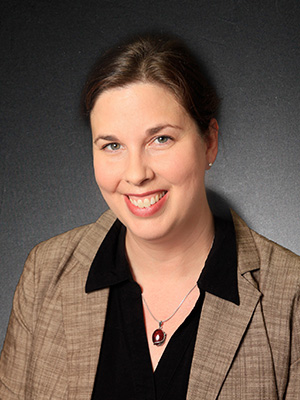
Trisha Jackson, PhD
Lead scientist and co-owner of Hometree Gardens LLC
Hailing from central Kansas, Jackson learned from experience to value prairies and rural community. Her educational and personal adventures took her around the world, where she admired diverse cultures, foods, and landscapes. Through her graduate studies in climatology and soil science, she came to understand the importance of soil health and decentralized food systems to create truly resilient rural communities brimming with healthy, delicious food. Today she teaches science at Pratt Community College and is the lead scientist at Hometree Gardens LLC her family’s farm venture where rich, fertile soil is the number one crop.
2020 presentation:
How Healthy Soils Grow Resiliency of People and Places From the ground up, healthy soils contribute to clean water and air as well as people.
Summary: “How Healthy Soils Grow Resiliency of People and Places” – From the ground up, healthy soils contribute to clean water and air. This talk will touch on the science of healthy soil, expressions of resilience from sustainability science, and provide several case studies illustrating how healthy soils make dramatic impacts on all these systems. One case study will include Dr. Jackson’s most recent research on integrating biochar into agricultural systems and the realized and potential impacts on soil health, agricultural economics, and rural communities. CEU Requested: Crop Management- Innovations in cropping systems management
“Women in Regenerative Agriculture” Panel Discussion
SUMMARY: Women, who are often considered the backbone of agricultural operations, are stepping up to the forefront of regenerative agriculture. Hear from women leaders in regenerative agriculture about their experiences and journeys as they have transitioned soil, ideas, and communities. Each panel member has a unique story that led them from various career paths and into soil health education. CEU Requested: Crop Management- Innovations in cropping systems management
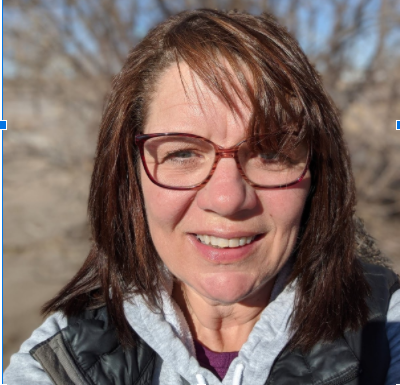
Linda Pechin-Long
Graze The Prairie
After more than 25 years as a chef, Long joined her husband, Keith, in the grass-fed beef business. They created Graze The Prairie in 2012 and started direct marketing in 2013. They are stewards of the land and work in concert with nature mimicking the way the prairie evolved. Linda is a Holistic Management International certified practitioner and recognized by HMI as an outstanding Holistic Management Demonstration Site. She’s also on track to become an HMI certified educator.
2020 presentation:
“Women in Regenerative Agriculture” Panel Discussion
SUMMARY: Women, who are often considered the backbone of agricultural operations, are stepping up to the forefront of regenerative agriculture. Hear from women leaders in regenerative agriculture about their experiences and journeys as they have transitioned soil, ideas, and communities. Each panel member has a unique story that led them from various career paths and into soil health education. CEU Requested: Crop Management- Innovations in cropping systems management
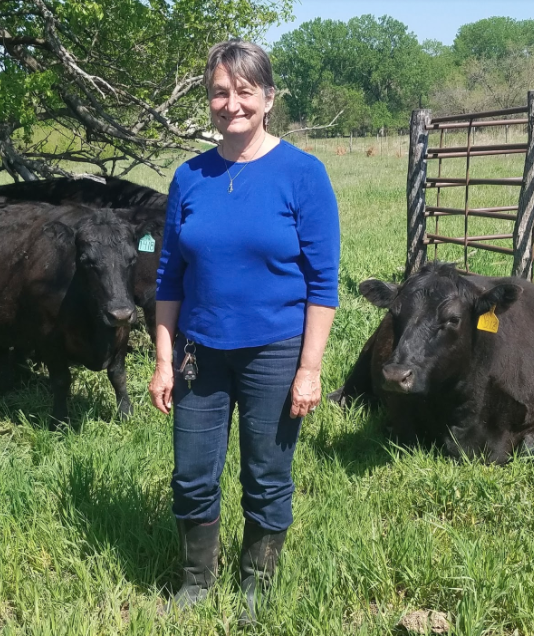
Lucinda Stuenkel
Sunny Day Farms
“Necessity is the Mother of Invention.” Lucinda Hardesty Stuenkel grew up on a dairy farm where her responsibilities were the bulls, replacement heifers, and the show cattle. After college, she became a college professor but gave that up when she married a farmer. Nine years ago, Lucinda’s farmer husband and farm partner brother-in-law were killed in an accident. With women and children running the operation, some things needed to be done differently. Through trial and error, Lucinda has learned these labor-saving techniques for managing a cow/calf herd and a grass-fed/grass-finished beef herd. She has adopted ways to accomplish the same tasks without having to lift and carry everything.
2020 presentation:
Weed or Forage: What is it to Your Livestock?
Summary: Given a choice, your livestock love to eat certain weeds and tree leaves. Many of these “weeds” are more nutritious than alfalfa. Certain weeds can also heal pastures from overgrazing. Other weeds can heal soil from compaction, flooding, and low fertility. Before you kill these weeds (a.k.a. forbs), learn which ones are beneficial to soil health and for use as livestock forage. Utilizing weeds as forage during a drought can make the difference between needing to sell livestock or being able to keep them. Certain weeds can also be used to renovate flooded land, so many Midwestern U.S. farmers can benefit from this information to plant these forbs or at least let them grow to heal the land rather than do more harm by unknowingly killing nature’s beneficial plants just because we are unaware of their beneficial properties. Similarly, weeds (a.k.a. forbs) can be used to increase the carbon and nutrients in the soil to increase fertility in pastures and cropland. Integrating a proactive cover crop program has helped no-tiller Lucinda Stuenkel produce healthier soils and a productive cattle herd. CEU Requested: Crop Management- Management techniques for pasture or range management systems
“Women in Regenerative Agriculture” Panel Discussion
SUMMARY: Women, who are often considered the backbone of agricultural operations, are stepping up to the forefront of regenerative agriculture. Hear from women leaders in regenerative agriculture about their experiences and journeys as they have transitioned soil, ideas, and communities. Each panel member has a unique story that led them from various career paths and into soil health education. CEU Requested: Crop Management- Innovations in cropping systems management
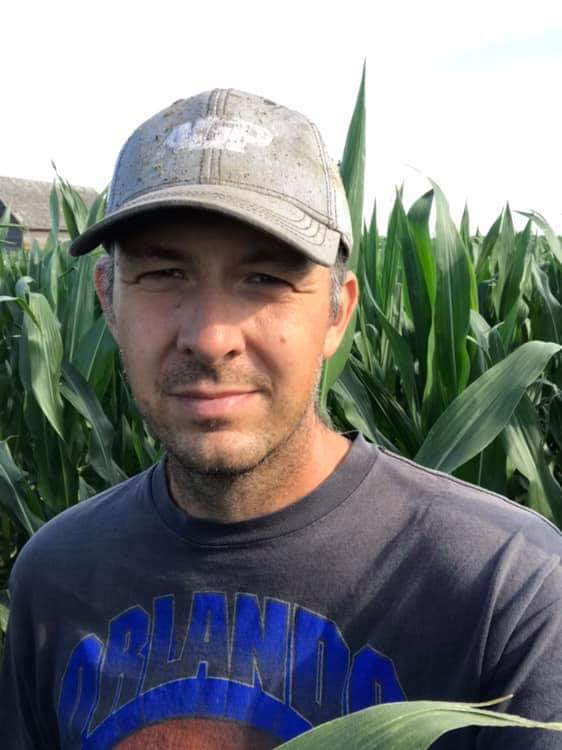
Michael Thompson
Thompson Farm & Ranch
Michael, Brian, and Richard Thompson farm in Furnas County, Nebraska, and Norton County, Kansas. They have been no-till since 2000 and integrated cover crops and grazing cattle on cropland in 2009. The addition of livestock has helped improve the soil on their farms. The cover crops provide a diverse feed for their cow/calf operation. Cover crops have been used to replace 100 percent of summer fallow. Rotational grazing is used to maintain as much groundcover and limit compaction as much as possible. The focus on grazing, cover crops and keeping growing crops on farmland have helped to grow organic matter to 3 percent and keep chemical-resistant weeds at bay.
2020 presentation:
Why is Soil Health Important? This presentation will cover how we use no-till, cover crops, and grazing cattle on farmland to build healthy carbon-rich soil.
Summary: Join Colorado Conservation Tillage Association President, Michael Thompson as he gives a compelling presentation over why soil health is so important. The focus will be on grazing cover crops and keeping growing crops on farmland at all times of the year. These cropping methods have helped to grow organic matter to 3 percent and keep chemical-resistant weeds at bay on the operation. Thompson will also discuss the more than $1.6 million award through the On-Farm Conservation Innovation Trials Soil Health Demonstrations, a new component of the Conservation Innovation Grants authorized in the 2018 Farm Bill. Come learn how the project will support producers in the High Plains by providing incentive payments to create and implement Comprehensive Soil Health Management Plans, facilitating a farmer-to-farmer mentoring program, and conducting a thorough evaluation of soil health, nutrient density, economic factors, and social outcomes on participating farms. CEU Requested: Soil and Water Management- Soil degradation causes and remedies
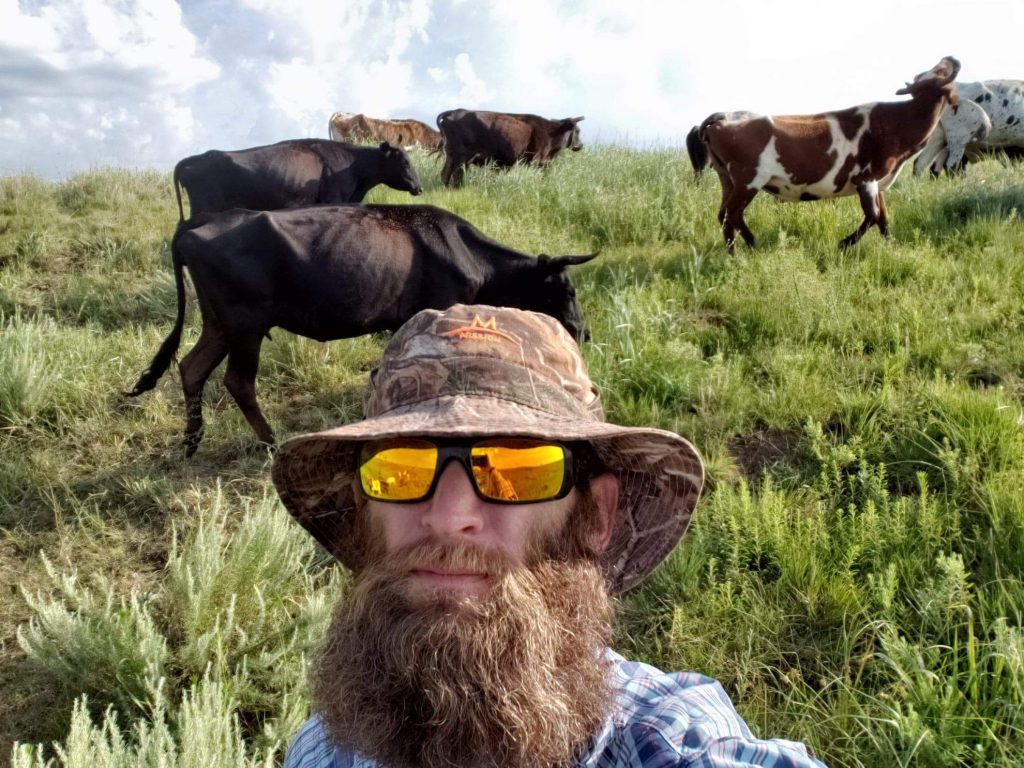
Brian Alexander
Alexander Ranch
Alexander Ranch, located in Barber County, Kansas, aims to manage all integrated resources in order to maximize the production of protein, shape a harmonious existence with nature and maintain economic viability. Brian, son of Ted Alexander, returned to the ranch in 2006 and manages the day-to-day operation. Brian is a grazing engineer; he solves land problems with livestock. They operate a 7,000-acre cattle ranch in south central Kansas using a managed intensive grazing system.
2020 presentation:
Pastures Need Soil Health, Too
Summary: “Pastures Need Soil Health too” – Brian Alexander (aka “Redhills Rancher’) will be talking about the 35+ year holistic journey of the Alexander Ranch and the challenge of making a business out of overgrazed land covered with invasive Eastern Red Cedar trees. Using less common methods of rotational grazing to increase the size of his herd, Brian will share how he was able to improve his sandy soil’s ability to handle what Mother Nature throws his way. For Alexander, fewer cedar trees mean less competition for water and sunlight, which stimulated the growth of desirable forages and improved water quality in creeks. With an improved water cycle, springs and intermittent streams that had been dry for decades began to flow again. Living and working in this unique landscape, he will share how he uses forward-thinking adaptive management to leveraging new technology to bring Range Management to a new level. CEU Requested: Crop Management – Management techniques for pasture or range management systems
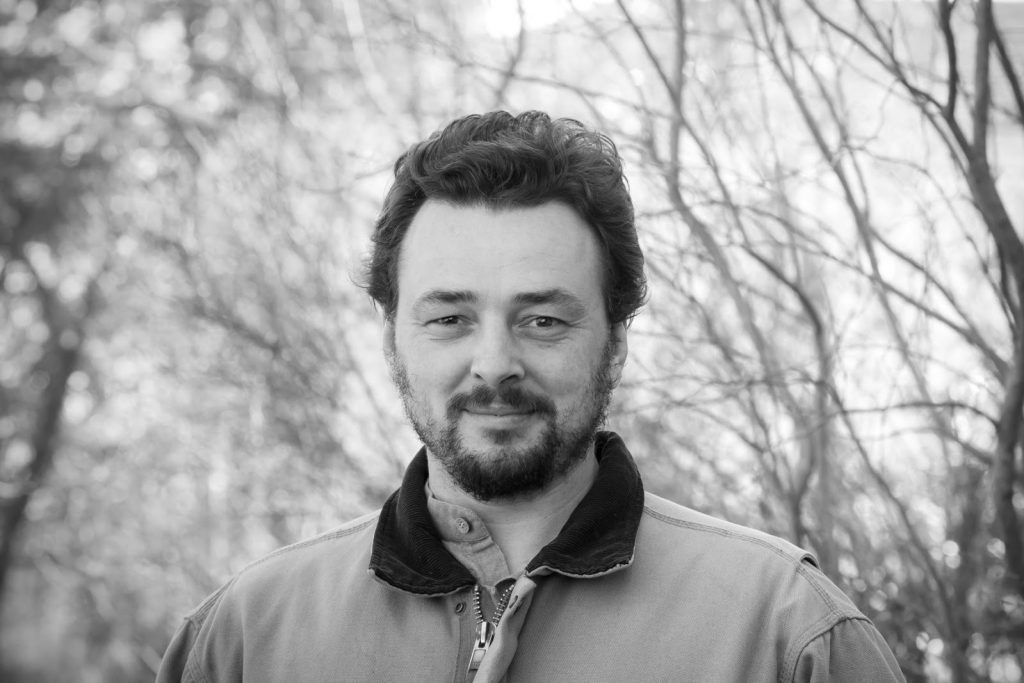
Dan Kittredge
Farmer and founder/E.D. of the Bionutrient Food Association
Dan Kittredge has been an organic farmer for more than 30 years and is the founder and executive director of the Bionutrient Food Association (BFA), a non-profit whose mission is to “increase quality in the food supply.” Known as one of the leading proponents of “nutrient density,” Dan works to demonstrate the connections between soil health, plant health, and human health. Out of these efforts was born the Real Food Campaign which has engineered a prototype of a hand-held consumer spectrometer designed to test nutrient density at the point of purchase. Via the Bionutrient Meter, the goal is to empower consumers to choose for nutrient quality and thereby leverage economic incentives to drive full system regeneration.
2020 presentation:
Principles to Produce Nutrient Dense Food
SUMMARY: Nutrient-Dense crops are the byproducts of well functioning biological systems. This workshop will cover a number of critical environmental conditions and management practices necessary for the production of these more flavorful, aromatic, nutritious, pest and disease resistant harvests. The foundational paradigm of how plants have evolved to operate in relation to their environments will be covered, along with practical suggestions having to do with seed quality, mineralization, minimal soil disturbance, inoculation, in-season monitoring, integrating cover crops, managing for soil aeration and hydration, and intention. CEU Requested: Nutrient Management Evaluating crop nutrient status
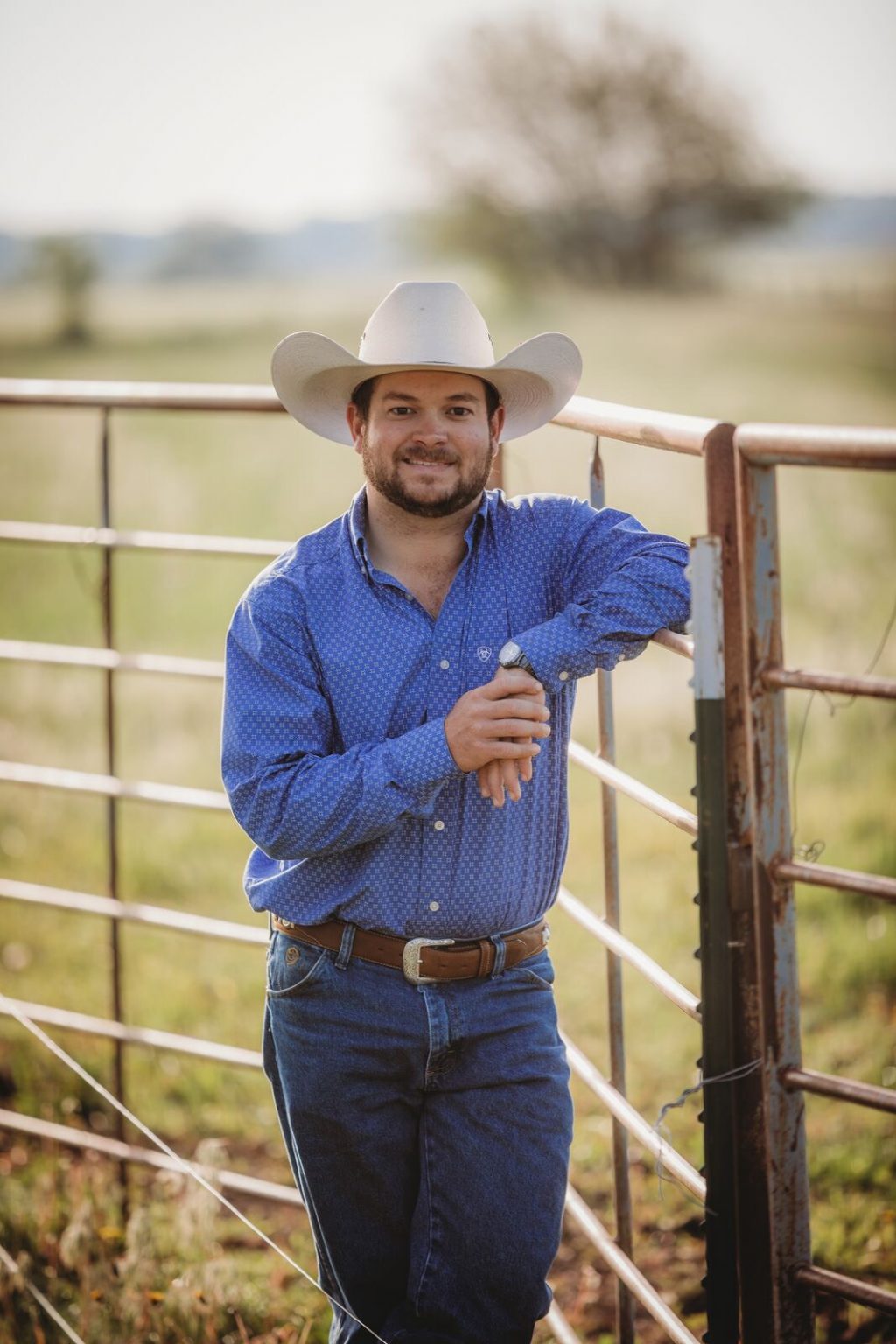
Jake Bevan
High Plains Agronomist – Indigo Ag
Bevan is an agronomist and regenerative farmer and rancher in south-central Kansas. As an independent crop consultant and Certified Crop Advisor, he has consulted with producers for the past seven years while delving into regenerative agriculture for the past three. During this time, Bevan’s goal has been to provide agronomic advice to benefit producers to every possible extent, while considering the environmental impact of our practices. Currently, Bevan works with Indigo Ag as an agronomist serving producers in the High Plains. He aims to help growers expand their business and increase profitability beyond a single season by providing year-round partnership, agronomic advice, and the support to optimize regenerative systems. Bevan’s work and love of the outdoors motivates him to continue to learn, seek, and grow while preserving natural resources along the way.
2020 presentation:
Lance Gunderson – The Haney Test: from Theory to Practice PLUS Producer Panel
SUMMARY: Understanding the results provided by the Haney Test may seem overwhelming, but there is meaning behind the numbers. The goal of this presentation is to provide you with the tools and understanding of how to walk through your own results. Learn the theory of many different soil health tests such as PLFA, Haney, soil enzymes, aggregate stability, and water holding capacity. In understanding what each test measures, we will begin to understand how to choose the correct test based on the primary resource concern. CEU Requested: Nutrient Management- Soil sampling procedures
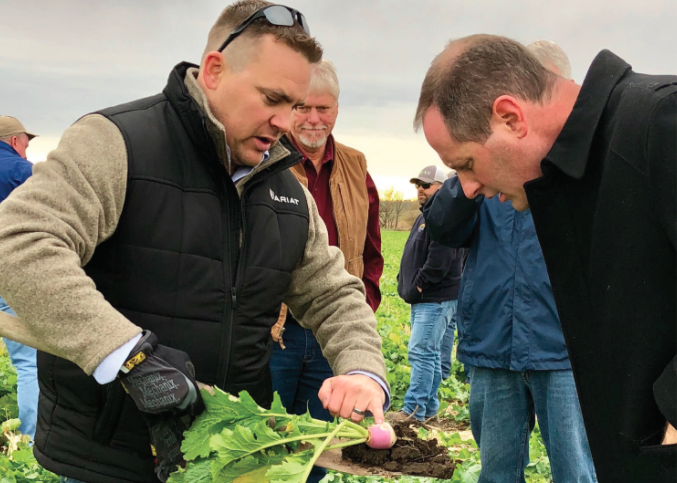
Andrew Lyon
Kansas Department of Health and Environment – WRAPS
Andrew Lyon is the Watershed Restoration and Protection Strategy Technical Unit program manager based out of Kansas Department of Health & Environment. He earned his bachelor’s degree in agricultural technology management from Kansas State University. His secondary major was in natural resource and environmental science and his minor was in agronomy. He also earned a master’s from Oklahoma State University in environmental science with an emphasis in watershed management and best management practice effectiveness. He ranches with his father and brother east of Emporia.
2020 presentation:
Kansas WRAPS – Soil Health Implementation Update This short presentation will update the attendees on KS WRAPS water quality program and innovative soil health opportunities being used in Kansas to improve water quality.
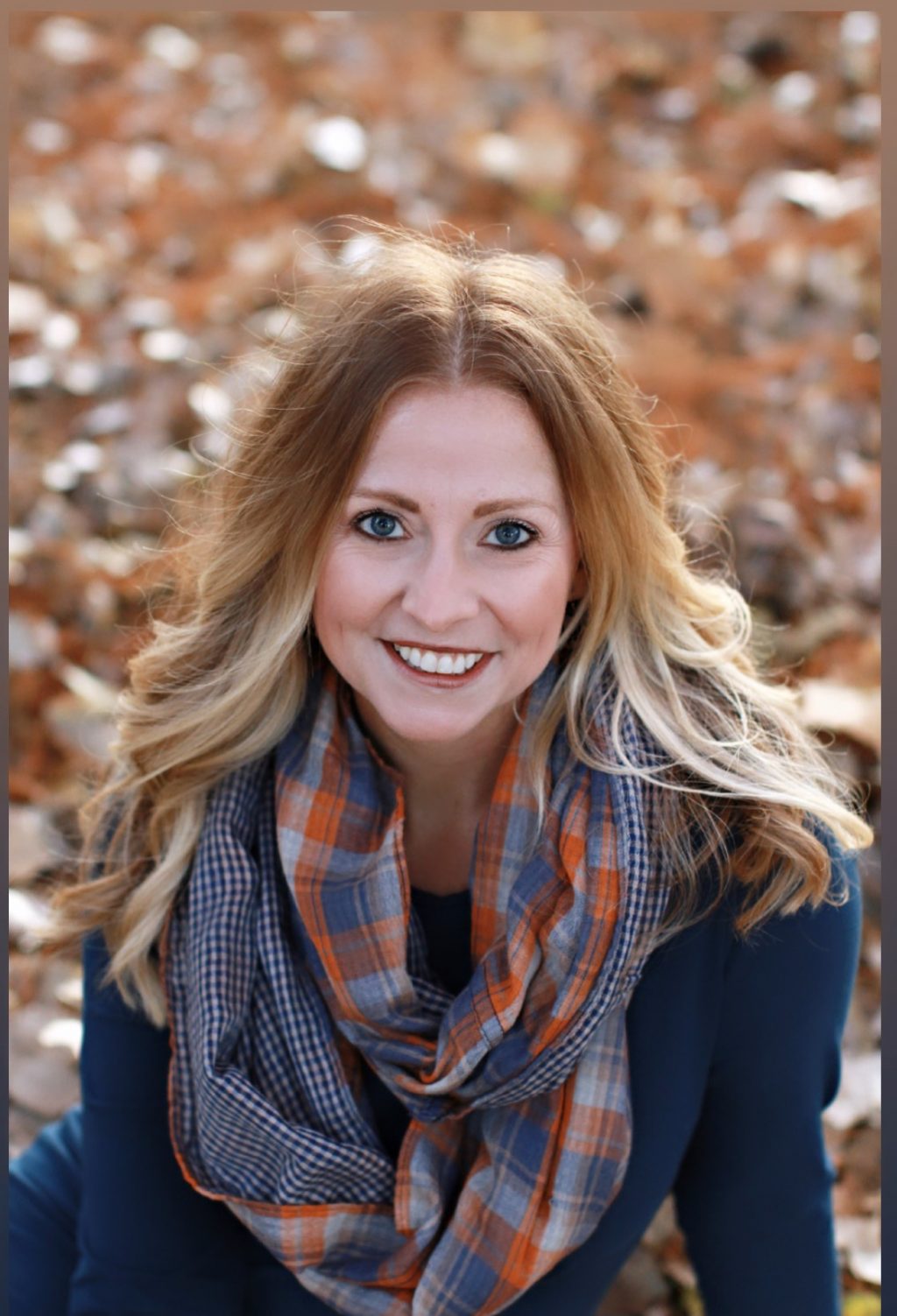
Jessica Gnad
Soil Health Content Consultant – High Plains Journal
Gnad’s path in soil health started with a curiosity about healthy food options in rural communities more than a decade ago. It was while she was living in Pratt, Kansas, and starting her family with her husband that Gnad worked to form a farmer’s market, a local food coop, and a Regenerative Ag School Garden with support from General Mills. She served as an executive board member for Kansas State Research and Extension, and as a healthy food/farm consultant with Pratt Regional Medical Center’s Health Coalition. She counts her background as a row crop farmer and an avid gardener growing fruits and vegetables as her foundation for her passion for regenerative agriculture. She and her husband owned and operated Crop Vision Consulting, an independent crop consulting agency servicing 20,000 acres in south-central Kansas. Today, they live in Manhattan, Kansas, with their three children. Jessica recently joined the HPJ team as the Soil Health U content consultant.
Regenerative Ag Producer Panel
SUMMARY: Hear from leading producers who have transitioned their farming operations from conventional operations into regenerative agriculture using a systems approach to decisions. Hear about the equipment changes, seed selection, soil health testing interpretation and the economic impact of soil health strategies. Moderated by Jess Gnad. CEU Requested: Crop Management- Innovations in cropping systems management
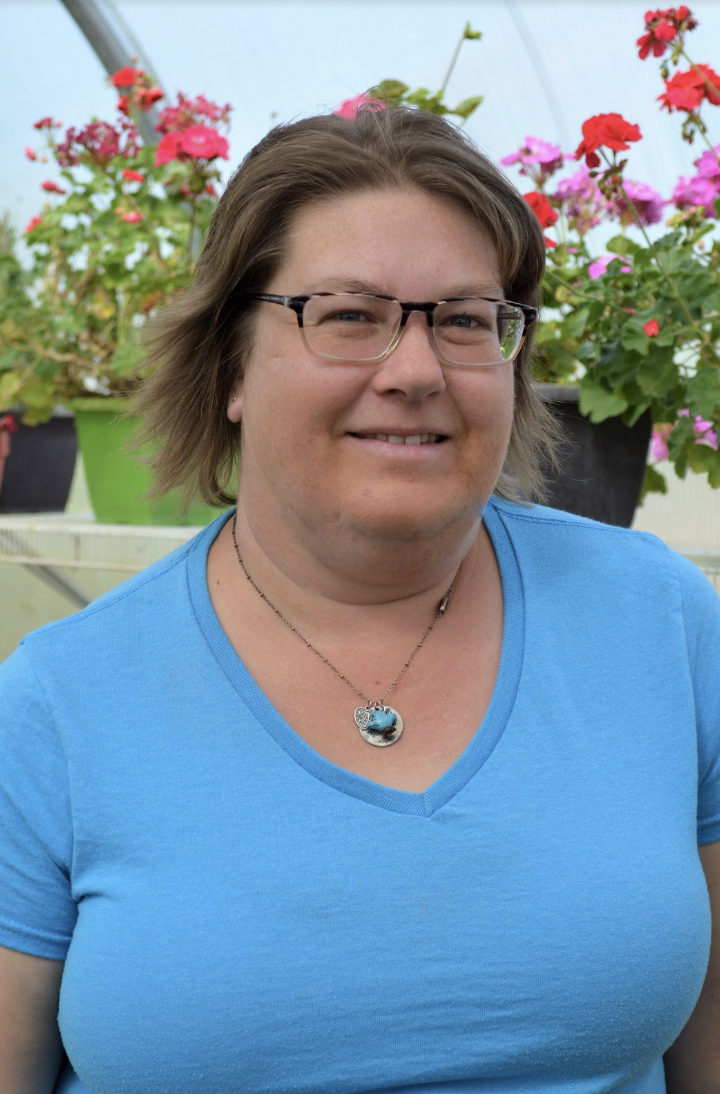
Ellen Mohler
Owner – MulberryLane Greenhouse, Kitchen and Farm Market
Ellen Mohler is owner and operator at MulberryLane Greenhouse, Kitchen and Farm Market at Sawyer and market manager for the Pratt Farmers market. Life experiences have helped shape her views on food and health. She, her husband and 3 children live in the old farmhouse and are the 4th generation of her family to farm on the same family land in Pratt County, both she and her husband coming from a long line of traditional farmers. As they transition their family farm from raising entirely commodity crops to growing nutrient-dense food, with an emphasis on regenerative agriculture and neighbors helping neighbors, they hope to help make local food a way of life in Pratt County and the surrounding areas.
2020 presentation:
“Women in Regenerative Agriculture” Panel Discussion
SUMMARY: Women, who are often considered the backbone of agricultural operations, are stepping up to the forefront of regenerative agriculture. Hear from women leaders in regenerative agriculture about their experiences and journeys as they have transitioned soil, ideas, and communities. Each panel member has a unique story that led them from various career paths and into soil health education. CEU Requested: Crop Management- Innovations in cropping systems management